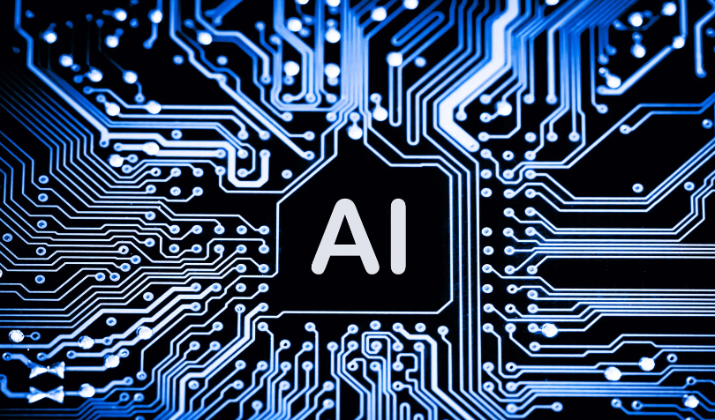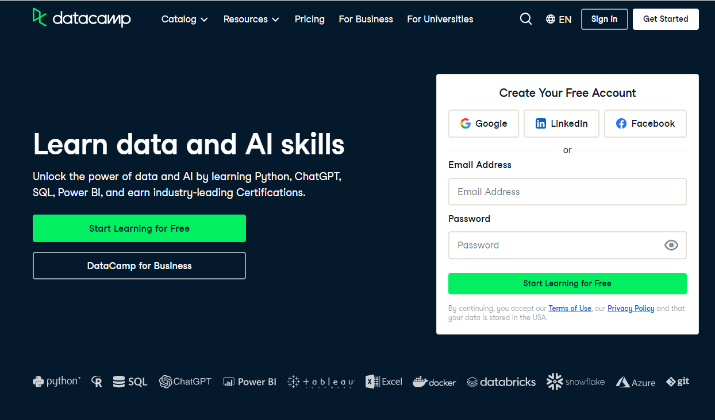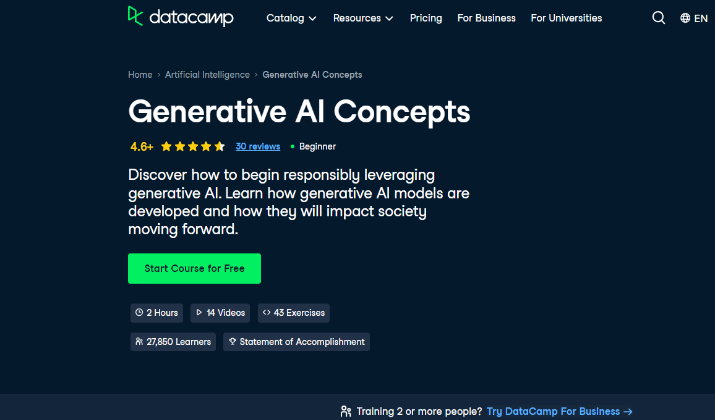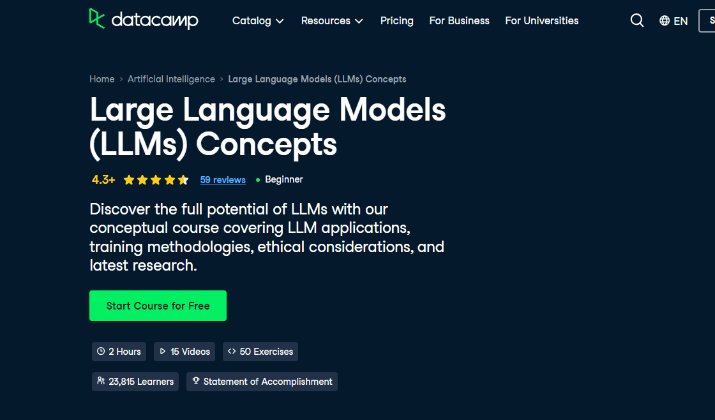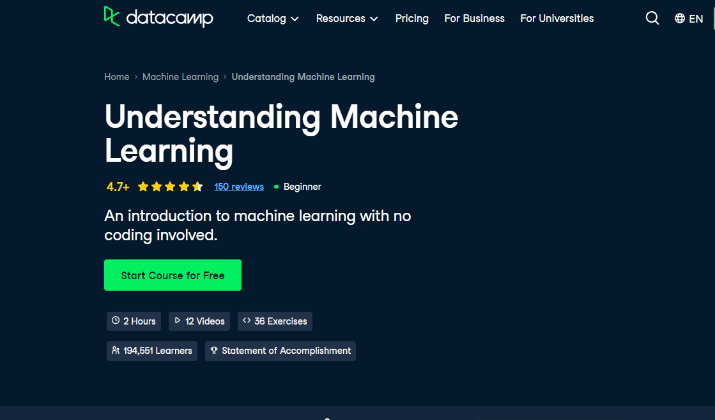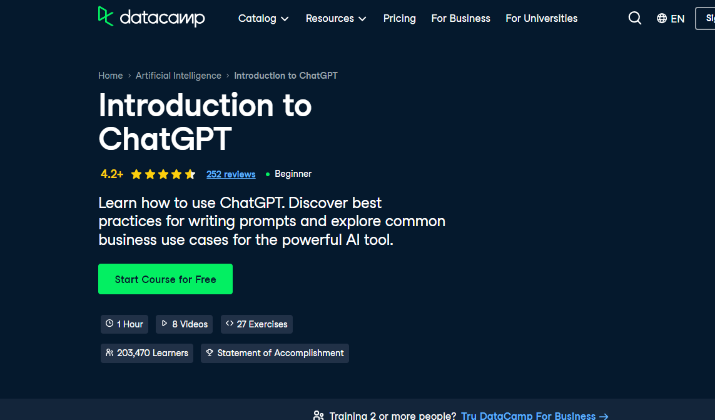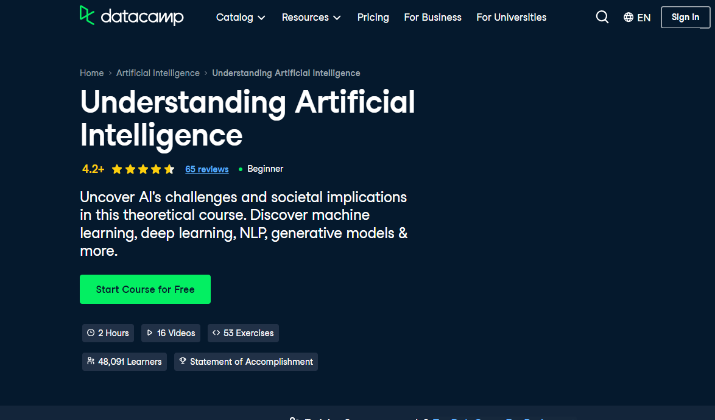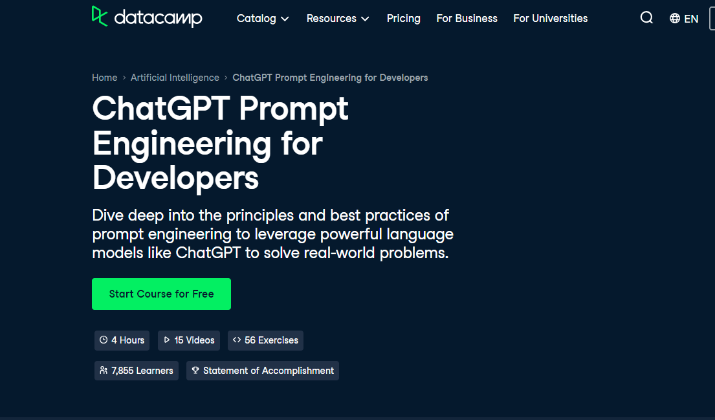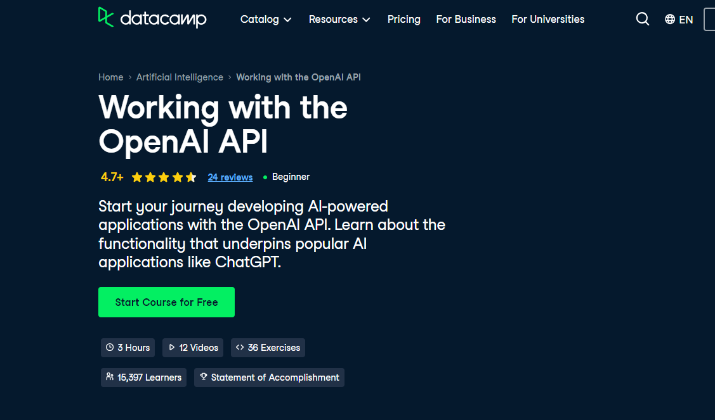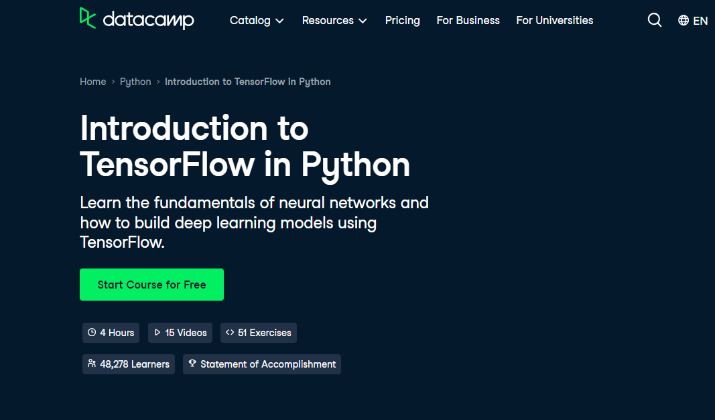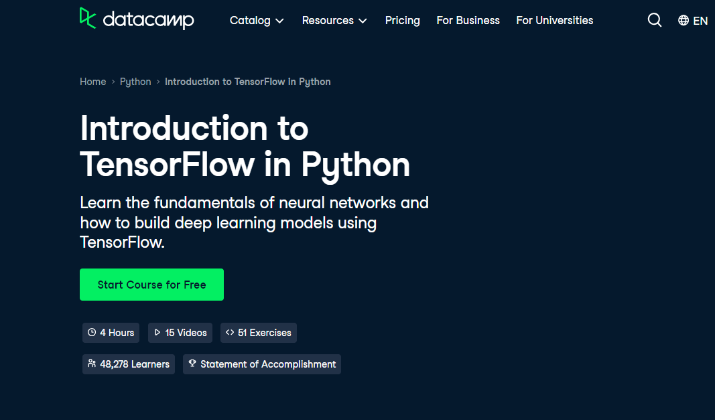Generative AI, often referred to as Gen AI, is a rapidly evolving field of artificial intelligence that enables the creation of content, images, music, and more that mimic human creativity.
As the applications of generative AI continue to expand, mastering this technology has become increasingly valuable for data scientists, AI enthusiasts, and professionals alike.
DataCamp, a leading online platform for data science education, offers a variety of courses tailored to mastering Generative AI.
These courses provide the essential skills needed to excel in this exciting field, from deep learning fundamentals to advanced techniques like prompt engineering and working with the OpenAI API.
In this article, we will explore the best DataCamp courses for generative AI, helping you unlock the creative potential of artificial intelligence to stay ahead of the learning curve.
Let’s dive in.
Generative AI
Generative AI is a type of AI model that can create new content, such as text, images, music, and more.
These models are trained on large datasets and use complex algorithms to generate novel outputs that are often indistinguishable from those created by humans.
Generative AI has numerous applications across various industries, including:
- Content Generation: Generative AI can be used to generate high-quality content such as articles, blog posts, and social media posts, reducing the need for human writers and editors.
- Image and Video Generation: Generative AI can be used to generate realistic images and videos, which can be used in various applications such as advertising, entertainment, and education.
- Music Generation: Generative AI can be used to generate music, which can be used in various applications such as film and television scores, video games, and advertising.
Importance of Mastering Generative AI Skills
Mastering generative AI skills is crucial for several reasons:
- Job Market: The demand for professionals with generative AI skills is increasing rapidly, making it an attractive career path for those interested in AI.
- Business Applications: Generative AI has numerous business applications, including content generation, image and video generation, and music generation, which can help businesses streamline their operations and improve their bottom line.
- Research and Development: Generative AI is a rapidly evolving field, and mastering its skills can help researchers and developers stay ahead of the curve and contribute to the advancement of AI technology.
Mastering generative AI skills is crucial for those interested in AI, as it can lead to new career opportunities and help businesses streamline their operations.
DataCamp offers a variety of courses tailored to mastering Generative AI, providing learners with the essential skills needed to excel in this exciting field.
Also read: DataCamp 50% Sale – How to Get it?
Get Started with DataCamp for FREE.The place to learn R, Python & Data Science. Check Special Pricing.
Why Choose DataCamp for Generative AI?
DataCamp is a reputed online platform for data science education, offering a comprehensive range of courses tailored to mastering Generative AI.
With its extensive library of courses and tutorials, DataCamp provides learners with the essential skills needed to excel in this exciting field.
Here are some key factors that make DataCamp an ideal choice for Generative AI courses:
- Comprehensive Course Library: DataCamp offers a diverse range of courses that cater to various skill levels, from beginners to advanced learners. These courses cover essential topics such as deep learning fundamentals, TensorFlow, PyTorch, and unsupervised learning, all of which are crucial for mastering Generative AI.
- Expert-Led Courses: Experts from top tech organizations handle classes in DataCamp, ensuring that learners receive high-quality instruction and hands-on experience. These experts have extensive knowledge and practical experience in the field of Generative AI, making them well-equipped to guide learners through the complexities of this technology.
- Interactive Learning Experience: DataCamp courses are designed to provide an interactive learning experience, incorporating hands-on exercises, projects, and real-world applications. This approach helps learners develop practical skills and apply theoretical knowledge to real-world problems.
- Certification and Career Advancement: The platform offers certifications in Generative AI, which can help learners demonstrate their expertise and advance their careers. These certifications are recognized industry-wide and can open up new job opportunities and career paths.
- Continuous Updates and Support: DataCamp continuously updates its courses to reflect the latest advancements in Generative AI. This ensures that learners stay current with the latest developments and trends in the field, making them more competitive in the job market.
- Accessibility and Flexibility: DataCamp courses are accessible online, allowing learners to study at their own pace and convenience. This flexibility is particularly useful for those with busy schedules or those who need to balance work and personal commitments.
- Cost-Effective: DataCamp courses are cost-effective, providing learners with high-quality instruction and resources at an affordable price. This makes it an attractive option for those who want to learn Generative AI without breaking the bank.
By choosing DataCamp, learners can gain the essential skills needed to excel in this exciting field and stay ahead of the curve in the rapidly evolving landscape of Generative AI.
Check out: Is DataCamp Free?
Beginner Courses for Generative AI
DataCamp offers a range of beginner-friendly courses designed to introduce learners to the fundamentals of Generative AI. These courses are perfect for those who are new to AI and want to gain a solid foundation in the field.
Here are some of the best beginner-friendly courses for Generative AI on DataCamp:
1. Generative AI Concepts
The Generative AI Concepts course from DataCamp provides a comprehensive introduction to the exciting field of generative AI.
In this no-coding course, learners will start by understanding how generative AI models create new content, from text to images and beyond.
They will explore where generative AI fits into the broader machine learning landscape and learn about the key steps involved in developing these models, including data collection, training, and evaluation.
Given the power of generative AI, the course also covers important legal and ethical considerations, teaching learners how to avoid bias and use this technology responsibly.
The course examines the future of generative AI and how learners can effectively leverage and collaborate with these transformative tools.
2. Large Language Models (LLMs) Concepts
This conceptual course covers the factors fueling the LLM boom, such as the deep learning revolution, data availability, and computing power.
Learners will explore how LLMs revolutionize businesses and everyday life with real-world examples, from finance to content creation.
The course delves into the building blocks of LLMs, including natural language processing techniques, fine-tuning strategies, and learning techniques like zero-shot, few-shot, and multi-shot learning.
Additionally, it addresses critical ethical and environmental considerations for LLMs, such as training data and privacy concerns, and explores future developments focusing on model explainability, unsupervised bias handling, computational efficiency, and enhanced creativity.
By the end of this course, learners will have a comprehensive understanding of LLMs, their capabilities, applications, and challenges.
Explore: Are Datacamp Courses Good?
Get Started with DataCamp for FREE.The place to learn R, Python & Data Science. Check Special Pricing.
3. Understanding Machine Learning
The Understanding Machine Learning course from DataCamp introduces learners to the fundamental concepts of machine learning without requiring any coding knowledge.
This two-hour course covers essential topics such as machine learning vocabulary, models, and deep learning, ensuring learners have a solid foundation in the field.
The course starts by defining machine learning and its relation to data science and artificial intelligence, then delves into machine learning models, including supervised and unsupervised learning.
It also explores deep learning, focusing on neural networks, computer vision, and natural language processing.
By the end of the course, learners will have a clear understanding of machine learning concepts, their applications, and the limits and dangers of machine learning.
Read this too: Are Datacamp Certificates Worth it?
4. Introduction to ChatGPT
The Introduction to ChatGPT course from DataCamp helps learners discover the powerful conversational language model, ChatGPT.
This course is designed to help learners understand how to use ChatGPT effectively and responsibly, covering topics such as its capabilities and limitations, writing prompts, and common business use cases.
Learners will discover how to evaluate new use cases and determine if ChatGPT is the right solution for their needs, as well as explore legal and ethical considerations for implementing ChatGPT in various situations.
By the end of the course, learners will be equipped with the skills to harness the full potential of ChatGPT and revolutionize their workflows and business processes.
Read this too: Best Dataquest Alternatives
Get Started with DataCamp for FREE.The place to learn R, Python & Data Science. Check Special Pricing.
5. Understanding Artificial Intelligence
The Understanding Artificial Intelligence course from DataCamp provides a comprehensive introduction to the rapidly evolving field of artificial intelligence.
Through hands-on activities and without any coding required, this non-technical course covers the key concepts and terminology that are shaping the AI landscape.
Learners will explore machine learning, deep learning, natural language processing, generative models, and more, gaining a solid understanding of how these AI techniques work and their real-world applications.
The course also examines the societal implications of AI, including the challenges and ethical considerations that come with the technology’s unstoppable progress.
By the end of the course, learners will have a broad understanding of AI and its transformative potential across various industries and aspects of daily life.
DataCamp’s beginner-friendly courses for Generative AI provide a solid foundation for learners to build upon. These courses cover the basics of AI, generative models, LLMs, and prompt engineering, making them perfect for those who are new to the field.
Explore: Best Free DataCamp Courses
Intermediate & Advanced Courses for Generative AI
DataCamp offers a range of intermediate and advanced courses designed to help learners master the intricacies of Generative AI.
These courses are perfect for those who have a solid foundation in AI and want to dive deeper into the technical aspects of Generative AI.
Here are some of the best intermediate and advanced courses for Generative AI on DataCamp:
1. ChatGPT Prompt Engineering for Developers
This expert-level course is designed for AI Prompt Engineers who want to master the art of crafting effective prompts for LLMs.
The ChatGPT Prompt Engineering for Developers course helps learners master the art of crafting effective prompts, designing structured outputs, and implementing intelligent conditional prompts to revolutionize their applications.
This comprehensive course covers the core principles and best practices of prompt engineering, including how to work with the OpenAI API in Python, and provides hands-on experience crafting effective prompts specifically tailored for ChatGPT.
By the end of the course, learners will be equipped with the skills to write effective prompts for ChatGPT to solve various real-world problems and business applications, making it an essential skill for any developer looking to maximize AI applications.
You might like this: How to Get 3 Months DataCamp With GitHub?
2. Working with the OpenAI API
This intermediate-to-expert course provides hands-on experience with the OpenAI API, which is a powerful tool for generating text, performing sentiment analysis, and more.
This comprehensive course covers the wide range of capabilities available via the OpenAI API, including text generation, classification tasks like sentiment analysis, and creating AI-powered chatbots.
Learners will also learn about the best practices for managing API usage across the business by utilizing API organizations and explore the OpenAI API’s various models, such as GPT and Whisper, to develop real-world applications.
Explore: Is DataCamp Free For Students?
Get Started with DataCamp for FREE.The place to learn R, Python & Data Science. Check Special Pricing.
3. Introduction to TensorFlow in Python
This course provides an in-depth look at TensorFlow, a popular deep learning framework widely used for building and training neural networks.
Learners will start by understanding the basics of TensorFlow, including how to define constants, variables, and perform basic operations like tensor multiplication and differentiation.
The course then dives into building linear models, covering topics such as loading and manipulating data, constructing loss functions, performing model training and optimization, and leveraging batch training to improve efficiency.
In the second half of the course, learners apply these same TensorFlow tools to build, train, and make predictions with neural networks, exploring concepts like dense layers, activation functions, optimizers, and regularization techniques.
Learners will learn how to use TensorFlow to implement various generative AI models, including GANs (Generative Adversarial Networks) and VAEs (Variational Autoencoders).
By the end of this course, learners will have a strong foundation in using TensorFlow 2.6 to develop powerful deep learning models.
Also read: 7 Best Coursera Alternatives
4. Intermediate Deep Learning with PyTorch
This course introduces learners to the powerful deep-learning framework PyTorch, known for its flexibility and ease of use.
The course covers topics such as tensors, automatic differentiation, and building neural networks, making it essential for anyone looking to master Generative AI.
This course covers advanced topics such as training robust neural networks, handling image and sequential data, and building specialized architectures like convolutional neural networks (CNNs) and recurrent neural networks (RNNs).
Learners will gain hands-on experience with PyTorch, learning how to prevent vanishing and exploding gradients, alleviate overfitting, and accelerate training with learning rate scheduling.
By the end of the course, learners will be equipped with the skills to develop robust deep learning models for a range of applications, including image and sequence models
DataCamp’s intermediate and advanced courses for Generative AI provide learners with the technical skills needed to excel in this exciting field.
These courses cover essential topics such as TensorFlow, PyTorch, and prompt engineering, making them perfect for those who want to take their Generative AI skills to the next level.
Check out: 8 Best Udacity Alternatives
Get Started with DataCamp for FREE.The place to learn R, Python & Data Science. Check Special Pricing.
Conclusion
The field of generative AI offers immense potential for innovation and creativity.
These courses cover various aspects of generative AI, including applications, ethical considerations, creative applications, and technical skills.
By exploring these courses, you can not only gain foundational knowledge and technical skills but also understand the ethical considerations surrounding generative AI.
Whether you are a beginner looking for an introduction to generative AI or an experienced professional aiming to deepen your understanding, these courses provide a comprehensive range of learning opportunities.

